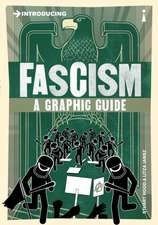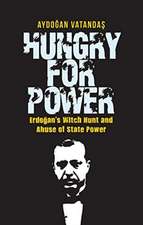Charisma and Fascism: Totalitarianism Movements and Political Religions
Editat de Antonio Costa Pinto, Roger Eatwell, Stein Ugelvik Larsenen Limba Engleză Paperback – 7 dec 2006
It shows how fascist leaders came to personify their movements and why the Führeprinzip was applied in all fascist organizations. It also explains how fascist leadership was of a very particular kind: It was almost unlimited in political discipline and required complete subordination. The legitimacy was based on a very vague notion of 'the organic unity of the state and the people', giving the leaders competence to rule without accountability to a party organization or state bodies. Thus, we can observe in all fascist parties/movements a practical form of leadership where policies of 'split and rule' were common in absence of principles of representation and opposition feedbacks. The fascist führer was the leader, the party, the ideology - and when in power: the state itself.
This book was previously published as a special issue of Totalitarian Movements and Political Religions.
| Toate formatele și edițiile | Preț | Express |
|---|---|---|
| Paperback (1) | 421.79 lei 43-57 zile | |
| Taylor & Francis – 7 dec 2006 | 421.79 lei 43-57 zile | |
| Hardback (1) | 1109.99 lei 43-57 zile | |
| Taylor & Francis – 7 dec 2006 | 1109.99 lei 43-57 zile |
Preț: 421.79 lei
Preț vechi: 496.22 lei
-15% Nou
Puncte Express: 633
Preț estimativ în valută:
80.71€ • 84.49$ • 66.78£
80.71€ • 84.49$ • 66.78£
Carte tipărită la comandă
Livrare economică 07-21 aprilie
Preluare comenzi: 021 569.72.76
Specificații
ISBN-13: 9780415419833
ISBN-10: 0415419832
Pagini: 176
Dimensiuni: 174 x 246 mm
Greutate: 0.3 kg
Ediția:New.
Editura: Taylor & Francis
Colecția Routledge
Seria Totalitarianism Movements and Political Religions
Locul publicării:Oxford, United Kingdom
ISBN-10: 0415419832
Pagini: 176
Dimensiuni: 174 x 246 mm
Greutate: 0.3 kg
Ediția:New.
Editura: Taylor & Francis
Colecția Routledge
Seria Totalitarianism Movements and Political Religions
Locul publicării:Oxford, United Kingdom
Cuprins
Part One Approaching Charisma; Chapter 1 The Concept and Theory of Charismatic Leadership, Roger Eatwell; Chapter 2 Hitler, Charisma and Structure: Reflections on Historical Methodology, Michel Dobry; Part Two The Leaders; Chapter 3 The Model of Charismatic Leadership and its Applicability to the Rule of Adolf Hitler, M. Rainer Lepsius; Chapter 4 Franco, the Spanish Falange and the Institutionalisation of Mission, Stanley G. Payne; Chapter 5 ‘Chaos’ and ‘Order’: Preto, Salazar and Charismatic Appeal in Inter-war Portugal, António Costa Pinto; Chapter 6 Charisma and Hybrid Legitimacy in Pétain's État français (1940–44), Marc Olivier Baruch; Chapter 7 Ante Paveli?, Charisma and National Mission in Wartime Croatia, Ivo Goldstein; Chapter 8 Charisma from below? The Quisling Case in Norway, Stein Ugelvik Larsen; Chapter 9 Codreanu, Romanian National Traditions and Charisma, Stephen Fischer-Galati; Chapter 10 Mussolini as the Prototypical Charismatic Dictator, Emilio Gentile; conclusion Conclusion: Fascism, Dictators and Charisma, António Costa Pinto*, Stein Ugelvik Larsen**;
Notă biografică
António Costa Pinto is professor of Modern European History and Politics at the Institute of Social Science, University of Lisbon.,
Roger Eatwell is professor of European Politics at the University of Bath,
Stein Ugelvik Larsen is professor of Comparative Politics at the Department of Comparative Politics, University of Bergen.
Roger Eatwell is professor of European Politics at the University of Bath,
Stein Ugelvik Larsen is professor of Comparative Politics at the Department of Comparative Politics, University of Bergen.
Descriere
Fascism remains a topic that fascinates both academic and general audiences. This is the first book to look systematically at the leaders of fascism and related movements in the inter-war era. It shows how fascist leaders came to personify their movements and why the Führeprinzip was applied in all fascist organizations.






























